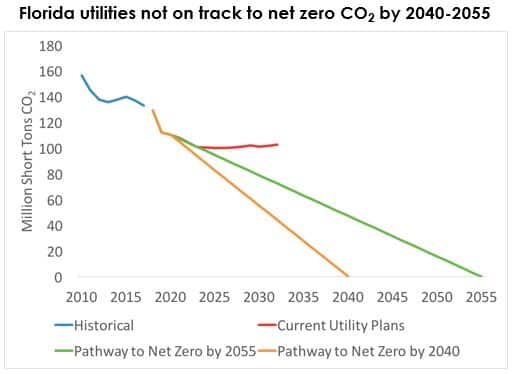Every year, regulated Florida utilities file a Ten Year Site Plan (TYSP) with the Florida Public Service Commission (PSC). These plans are viewed as the equivalent of Integrated Resource Plans (IRPs) done by utilities in other states. However, the TYSP process is an outlier in the resource planning process. Florida’s lack of a transparent and collaborative resource planning process has allowed utilities to plan to build new gas power plants well into the future, and thus increase Florida’s over-reliance on gas for power generation. Ramping up reliance on gas for the next ten years is shortsighted, at best, and harmful to Florida’s economy and environment.
Gas has played an important role in Florida’s power sector over the past decade. By employing new and efficient gas technologies, Florida utilities were able to retire coal power plants and thus reduce carbon dioxide (CO2) emissions while renewable energy technologies were still expensive.
As a result, gas has often been described as a “bridge fuel” that has aided in the transition from coal to renewables. While we don’t want to minimize the impact that gas has had historically, we recognize that bridges do not go on forever. With renewable cost and control improvements to date, a trend that shows no signs of stopping, it is time for Florida utilities to recognize that we have reached the end of the gas bridge and that it’s now crucial to invest in renewables, energy efficiency, and storage for the future.

How is Florida an outlier?
Florida’s PSC TYSP process is an outlier in the resource planning process that allows utilities to take half-measures, like over-reliance on gas, in creating progressive plans for the future. The PSC’s outlier status is multi-tiered:
- Florida’s TYSP process lacks transparency as most data, assumptions, and scenarios used by utilities in the planning process are not provided.
- Most IRPs require the utility to file data and assumptions. Many IRPs also require the utility to consider certain scenarios, such as a low-carbon policy scenario.
- TYSPs do not present alternative scenarios, and stakeholders and the commission can only react to plans instead of engaging directly in the development of a plan.
- Traditional IRP processes include feedback between stakeholders, regulators, and the utilities through at least one iteration of a draft IRP before the plan becomes final.
- Additionally, some IRP processes allow stakeholders to develop at least one scenario that the utility runs through its resource planning process.
- TYSPs do not require demand-side measures to compete with supply-side technologies to meet customer needs; utilities feed energy efficiency goals from the FEECA process directly into load forecasts.
- Energy efficiency is the lowest cost resource and results in zero harmful emissions. Many jurisdictions require utilities to include energy efficiency in IRPs by including EE measures as options the resource planning model can pick to meet future load needs at the least cost. One example of where this has been successfully implemented is the Northwest, where energy efficiency has lowered bills for both participating and non-participating customers.
- Beyond a traditional IRP process, Florida could take steps to include more direct competition between technologies when planning for the future. The extreme of this is wholesale competition between generators, and is unlikely to exist in the near or medium-term in Florida’s regulated electricity sector. Instead of going all the way to competition, Florida could implement an All-Source Procurement model where resource planning includes actual bid prices and a technology-neutral procurement process when there is a need for additional generation, saving customers money.
- See our report on Best Practices for All-Source Procurement for more information.

Florida’s outlier status results in gas-heavy future plans
If Florida utilities make the state even more reliant on gas for power generation in the future, as these TYSPs suggest, it will prove to be costly and risky to ratepayers without addressing the emissions gas generation emits that contribute to the climate crisis.
Renewables and energy efficiency are lower-cost resources and so would provide a better deal for Florida ratepayers. Additionally, Florida does not have native gas resources, and every year Florida utilities spend 20-25% of all revenues collected from electric customers on gas. That means $4-6 billion of Floridian’s money is sent out-of-state every year. Investing in solar and energy efficiency instead of building new gas power plants would keep more of that money in-state and generate clean, local jobs.

Under these TYSPs Florida’s CO2 emissions from power generation would reduce only until 2024, and then remain flat for the foreseeable future after that. This is far removed from where the science tells us emissions need to go to limit warming to 1.5-2 degrees C: net-zero by 2040-2055. Emission reductions beyond 2024 can only happen if Florida utilities retire existing fossil (coal and gas) plants and replace them with zero-emission sources like energy efficiency and solar. New gas plants will not further reduce emissions.
The economic and climate arguments against investments in new gas combine in a third argument: that new gas power plants would be at risk to become stranded assets and cause additional economic harm to customers in the future. The climate need stated above is likely to result in some sort of climate policy before 2030. This policy will require utilities to reduce emissions, so utilities will not be able to operate these new gas power plants as often or as long as intended, thus becoming stranded assets. Customers will be required to continue to pay for these plants even though the plants are no longer providing value.
Our ask: the Florida Commission hold a workshop on resource planning
We recommend that the Florida Commission hold a workshop to explore how Florida’s TYSP process compares to the resource planning processes elsewhere. We submitted comments that outline these arguments to the Florida Commission, and will present to the Commission on August 18, tune in through the PSC livestream (see slides for that presentation here).